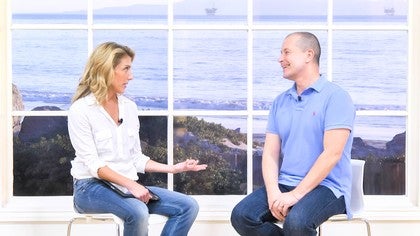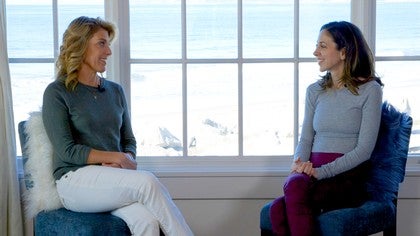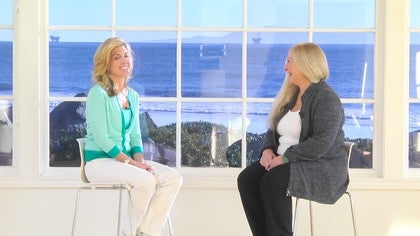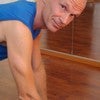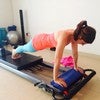Description
Michael takes us through his childhood in Northern England and how he discovered dance, which led him to study Pilates with Alan Herdman in London to rehabilitate a back injury from dance. Michael then took the opportunity in the 80's to work with Houston Ballet, developing their Pilates program and traveling the US to study under various instructors such as Romana Kryzanowska and Carola Trier. In the early 90's he moved to Los Angeles to teach at Karen Voight's fitness studio.
For Michael, Pilates is a training system to get the body to move better. He developed Pilates Spirals classes to help bring movement back into the body. We hope you enjoy learning more about Michael King and the background behind his creative classes.
About This Video
Transcript
Read Full Transcript
Chapter 1
Michael King's Childhood Discovering Dance
Hi there. I'm Christy Cooper and it gives me great pleasure to welcome back Michael King to the melodies anytime studio here in Carpentaria, California. Originally from northern England. Michael was a student at the London School of contemporary dance where he discovered [inaudible] with Allen Herdman as his first teacher for a period of time. He also took lessons with Romana Kris in Osca and her studio and in Corolla tree or studios.
He's a teacher of [inaudible] and a practitioner for almost 35 years. Michael currently lives in such as Spain where he and his partner, Malcolm Muirhead recently opened their new studio, Michael Kane Studios. This is Michael's fourth time with us here at Pilati is anytime. I think that's a first. Fourth is the first and we are grateful to have them back here with us.
Welcome back, Michael.
It's stunning. Stunning. And what a beautiful studio.
So it's a little bit of a bit like a Billy Elliot Story. Um, I hated sports because my sports teacher made everyone play football, soccer, and he was obsessed with it, so everyone had to play. And I loved gymnastics. I loved swimming, but he wanted everyone to play soccer. So we had got into this big battle and I remember I hated on the sports was always a Monday morning. And I would always try to make myself sick on a Sunday night and not to go to school on the Monday morning because he terrorized me. Um, but really, uh, an opportunity came up that, um, a local group, we're looking for some children to be in sound of music and they came to my school and I volunteered and that's how my fit is started. Um, I found I could dance and um, and then from there, from the school I went into a full time dance, um, school down in London with a place. And that's really how my dancing started.
But it was kind of Billy Elliot because it was tortured if this was pre John de Volta. So boys did not dance. Boys did not. So I was tortured by my friends. I was torching Brady one, the names, of course, my name is king, so kinky was my name in school, Kinney King. But it's quickly got into kinky because of the dancing. So, so, you know, it wasn't an easy time growing up. Of course, now boy's down this very, then they didn't dance. John Travolta came along and made things a lot easier for all of us because only it was cool to move.
And suddenly I thought Disneyland was here as far as I was concerned because suddenly I was surrounded by people that danced, which until that time and I felt very much like out of place in the northern town of Scunthorpe.
I use music for teaching bloody sometimes. Um, I mean I've always, music has been a big part of my life and the two things together and expressing myself through movement, it just was felt normal to me. It didn't feel strange. It just felt like it was what I was meant to do. So it definitely was a calling to it. Um, and you know, when I went into dance school, I thought this is life. I'll never, never stopped dancing, which of course I did stop dancing, but I thought that was just, it, it was just exactly what I was meant to be.
So we had to get a certain level of education to go to college. Um, I was up, my mothers get saying and she still says please get a normal job, whatever you do, just get a normal job. She wants to be, be to be a teacher. Okay. Which I can funny sort of way I am if she met a school teacher in school, so I was up to, I was up to go to Goldsmith University, um, from the sixth form and I was going to do the first co uh, cause in art and dance. It was a degree course and it was the first time they put it together. This was way back in the 70s. And um, and the audition came up, my dance teacher told me this audition had come up for the place. So I went to it saying I need to try this cause I knew it was be rooted.
And of course when I was accepted back then, it was a little bit easier for boys. There weren't that many boys dancing, so it was a lot more stressful for girls to get into it. But the audition was grueling. Uh, they tested you in every physical way. They looked at your posture, they looked at everything and, and I was accepted and so I had to make a decision. Did I go to the place they go to the dance school, the full time, uh, Grad school or did I go to the university? And of course I chose the grain school, which didn't please my family because they did want me to get a solid education.
But I just knew that for some reason that was where I was meant to be.
And I knew that's what I wanted passionately and so I did it. You know, it's like shopping for something. I want it, I'm going to get it. And it was same thing.
And the Graham school data have the numbers. So you knew it was either you or the person next to you that was going to be gone next year. And that that stress pushes you. I mean there's always that competitive and there's always been the competition in there, but you know, it's not a relaxed feeling. Uh, but I think, you know, you go through the stages of, you know, what you think is going to happen and then things come along and change things.
Chapter 2
Pilates with Alan Herdman in the 1970's
And we would go to class and at the time Alan had bought a blooded Herdman plot is to Europe. He was the, it's actually the school that the sent him to the states to train. And there was a himself and there's also an Australian woman, Sonya who was teaching and we'd have class several times a week, Matt class. And I don't think we looked forward to it cause we at the time we wanted to dance, we didn't want to lay down and lay on the floor and do conditioning exercises. Um, so it wasn't something that we really looked as I say, looked forward to. Um, but I do remember the classes.
I remember the first we had started from the very beginning and even getting into the school, um, Alan was involved. There was an osteopath per purposes. There's also physically looked at as to make sure that we had suitable bodies for, for the dance.
So you get to work with Alan some somewhere along the way. He opens a studio. How does it come to be that you and our friend Julian now are going to, you're going to work for him. Are you going to help them set it up? Cause you just, and I know Allen mentioned this too about y'all painting,
It was a big church, um, and enormous church, whole cold one, but it didn't have a basement. And I remember had nowhere to live at the time. And so I, I moved my small belongings, my bags into the [inaudible]
Okay.
So Allen's set sent me over to, um, to Houston to run the, uh, studio for, for three months cause it was on a visitor's visa.
I was on that first plane with my bags. Uh, you know, you could not stop me. I thought this is the huge opportunity.
I was in heaven. It was a great,
But being a young, you know, Brat, teenager, you know, well not teenagers by then I was in my twenties, early twenties. Um, I was like, you know, I was determined to get back to the u s so I left Allen and set up a my own studio and then a year later the opportunity to come back to go back to um, uh, to Houston. So the studio I set up in London was a pineapple dance videos. It was when pineapple first opened up. It was a great fun place in the 80s. Um, it was a really the happening dance place. And I had the first, uh, blooded studio in that, in the, um, in that building it was called pineapple cause it was all pineapple warehouse. Um, and it was, everyone was there. All the dancers with their oldest shows were there.
All the classes were there and it was a great time to be at Piner ball. But when they called me from Houston and said they wanted me to go back, of course I said yes. So I left pineapple and moved back to Houston where I stayed almost 10 years.
Chapter 3
Learning from Romana and Carola in the 1980's
And what can you share about that?
And that's where I met Patrice and Elizabeth Larkam. Um, I also went to New York and, uh, they, I did class with Corollas across the studio and also class Ramana's studio, uh, is quite interesting. Romanos because, um, you know, to me it was like, you know, uh, Disneyland, I was the, in this, this plot is geo, but I was most shocked that I was seeing things that I hadn't seen before. I mean, you know, like anyone, you think, you think you know everything when you, when you train with a teacher and then when you suddenly start going out, you send to suddenly realize that, uh, you know, one in the morning with Corolla, things were slightly different in the afternoon with Ramana. And so I learned very early on the tapestry of what we call plot is, is very rich and very varied. And, and, you know, Alan taught me valuable stuff, but then when I started learning with the others, then I suddenly started including more in my repertoire. I learned a lot more things like the petty ball and things which I'd never seen before, which Alan wasn't incorporating back then. So I came back, um, after and also other places, I think it was in, um, Cleveland. I was even in Cleveland.
I religiously all the major centers at the time and then went back to Houston and we expanded the program to bring more of the full repertoire working with more of the traditional [inaudible] cause we were working with dances.
But it made me really think about how I was doing it. The same thing, that reminder when I first went in that the teacher has working with said, you know, remodel won't speak to you. You have to becoming for a long time. And um, she came in and, and it was to this day, I don't quite know why she came over and corrected me and uh, and then kept correcting me. I don't know if it's, cause I was British, I was a dancer or my technique was so bad that she just couldn't stand it. Um, but the teacher was teaching me, he was quite shocked that I got the attention. So I felt very special. It's still a bit dazed cause it was, it was a huge learning. I mean, as I say, I was quite confident. I knew everything and then I was out there. And so really from that early days I've really stayed open and said, look, you know, everything, everyone in this world we've got in the plotters world has something to offer to you and we have to stay open. And it was really from that early experience that, that I try and install that in my teachers that I'm training and saying, look, you know, go to take from here to take from here, be a sponge, learn from as many people as you can because you will never know it all, you know, you will. I don't know it all, you know, no one ever will, but you have to continue that learning is a huge part. And, and that comes from those early days.
So I had then I was dealing with the plugs in the daytime and the teaching robot usually in the evening. Um, and it was, I was doing a lot of aerobics. I was jumping up and down and going crazy, you know, and thinking was the best thing ever. So that has always been a part of my life. I went on to teach other things, not just, um, aerobics. I taught step when it came out, it was called originally bench work from Atlanta. Um, we used to use these 12, 12 foot benches and there was six inches high and 12 inches high and three people we use at the same time. And the music was really fast. And so, you know, again, I thought this was fantastic. Anything movement and you know, I just love moving to the music. Um, then when Kenneth Cooper came out with the, you might do it a little bit slower. I was 24 beats per minute.
So I was really heavily involved. In fact, I worked for Alpha, I was one of the certification specialists now for, um, and so I started teaching courses in, um, in fitness. And that really has helped me when we started creating courses in Pilatos, you know, because it, it was really structured very well. You know, AFA taught me how to ask questions after taught me how to structure courses and how to break them down. I had to break movements down and I think looking at the plotters method as well, I mean I've learned movement through Allen, so I learned modified. But then looking at the work I did from New York, I learned, you know, pretty much full on traditional work. Um, but I remember the early days in a row, bigs first fitness leaders, um, manuals. Uh, we had, there was these big photographs and in those photographs there were big crosses in there. And underneath it you said contra-indicated movement. And so you start sweating and this word was like evil word.
So is it contraindicated? It's contraindicated. And, um, and now I course I realized there's no such thing as a contrary, contraindicated movement. If someone's got flexibility and they've got strength, you can do anything. I mean, look, it's like the Sleigh, you know, it's not actually the movements that are bad and contra-indicated it's actually the people coming to us. And that really, I came from fitness. I mean, we didn't learn anatomy physiology with plotters originally. Now we need to know a lot about that because the people were coming to us. We needed to understand it. But, you know, fitness led me and I always say there's almost two sides of my life. You know, there's a plotted side going on and there was a fitness side going on and they all kind of work together. Now, physically, I couldn't have done my fitness without the polities because that dance injury from dance school, you know, it was always been there. It kicks off every so often. In fact, this morning my back wasn't feeling that great. Um, and so I had to do my plot is to pull it back together again. So for me, it's always been a marriage. It's never been something which I've seen as separate. Um, of course, moving to La after Houston valley, I moved to La and started working at the voice studio in, which is a lot of fun. I was there for five years. So
That was what she was known for. She was the body in perfect on Travolta's movie. She was the goddess of fitness. Everybody who was, anybody in fitness went to her studio and included, including me, I went to to meet people like you. And so this is where you're teaching.
Jane Fonda Studio on Robertson had closed down and Karen and a husband, Hank opened up their studio on La Cienega and she was the goddess of the, you know, of that time, the nineties is every poster posters. Yeah. The legs, the totally, the degree's legs, everything. Everyone knew about strength and something go late. So I decided I'd, well, I met somebody in decided I want to leave Houston valley, which again, people thought I was crazy. I think my mother started crying again. Um, because I had a public job with all the benefits. Yeah. And so I moved to La and auditioned to teach, avoid. Um, it was an interesting day because that day, um, you know, I literally put everything in my hue hole I've been out before and they said to me, oh no, if you're in La living here, we can't consider you.
And that was really my decision. I thought, well, I've got to move though. So I loaded up everything into you hole, including my dog, which was a husky. And we drove from Texas to La, which took like two days and got to, and so immediate went back and said, okay, I've moved, you know, I'm here to audition and Karen, they can be waiting in the studio. And County came in and gave me a very brief, uh, um, audition where I had to show some movement and then she walked out without saying anything. And I was like, oh my God. So Hank the husband said, well, we don't have anything at the moment but we'll call you if you need it, if we need you. So I'm thinking, what have I done? So that night I hit the Margaritas and thought, this is it. I've made a bad decision. Luckily one of the teachers at the time, Martin Henry had left that day. This is what I know. And the reason they kept me waiting was they're having this whole thing go around with his Majid Henry. And he was teaching a lot of classes that void.
So when I got back in that night for Margaritas, I got this voicemail message from Hank saying, as of tomorrow, you have a lot of classes, please be here tomorrow morning. And that's how I walked into void. Um, now I was also teaching is at the time there was, I was working, um, it was a studio on just off Robertson called studio c. And I was also teaching a lot of the clients had their reformers in the houses and I was doing a lot of personal training. Uh, when I'd come out for that trip from the Houston valley, I'd visited, um, Ron and Mike, Michael and Diane, uh, at that studio and happened to meet Ron at that time. Diane Severino. Michael Pod was absolutely and took some classes with them and yeah, we want to do a letter to do who's traveling at the time. But, um, he was, I was looking up that he was there and I met him. Um, and it was great. And he was just spoke very highly of Allen. Uh, I wasn't sure if they knew each other, but he's, he spoke how, what good things he was doing in Europe. And um, so I, but I'd met them now also at the time the we Windsor had was opening a studio.
So I was, I help teach with her when she first opened a studio. Oh, I don't think I slept well. I'd give him a full time job. I had to get income and interesting about Voight was they paid you per person. Yeah, I remember that. So those classes were, well, some of them were big. Well, Kevin's of course was huge and there was buses of Japanese pulling up and the people were going in. So you, it was a very competitive place, which again, took me back to the dance school. I mean, I always did it in a competitive area. And, um, we've got a base salary, which I think was like $6.
And then on top of that you've got like a dollar a dollar 50, depending on who you were, uh, per person. So, and there were five danced years there. And so you really had to get people in your class to 'em money. And so there was a stress. And so I would maybe five classes going on at once, absolutely five classes at the same time. And there was some very popular teachers in, I mean, Billy Goodson was teaching there. He was early, you know, he was a really person that really started fuck. I mean he was the, the original funk teacher, but a good Sir Patrick Goodo. I mean some great teachers, Chris Toledo.
So I made the voyage for here, Eric Swartz who, you know, there was some really fabulous and of course Karen and um, so we w you had to work hard to get people into your class. Did you teach politeness there? I tried to. So sorry, what year are we in? Well now I left Houston in 89, so it was like 1990. I was there, avoids on 94 95. Um, and I tried because of course it was instinct to me. I was like, okay, can we have a glass? Cause it in Houston valley, I set up an adult program where we opened up to the adult market and we were teaching group exercise classes as well as platas. So to me it seemed a natural, I wanted people to know Plata is a, it was no one came, you know, we put, no one came. We put it on the dining table. Yeah.
I had three friends who I've made come and you know, at least I got money for three of them, but no, it didn't work. Um, it was still high impact step. I was the first teacher that void to teach step cause I'd done it in Texas. They use me to um, to start that program there. Um, and it was great, you know, and so for me, really the happiest moment is when this explosion in the method happened and suddenly everybody wants to plot is because I'd been pushing it saying, okay, don't just do fitness. You need plotters. Yeah. And, and so that, that was the greatest time to me. He was going to say, when everything did come together, my took my life funny, came together.
Chapter 4
The Development of Pilates Spirals
I've always say, and I say and will say it and say polite is a training system to move your body to train your body to move better. Yeah. So we need to move, we need movement, we need dancing, we need walking, we need spinning, we need cycling, we need running. We need all of that. What pilot is does is train you to do that better.
And so it's an instinct for me and I, I gave her nervous when people come to me and say, I just do [inaudible] and I'm very well, like I somehow know ball well it's no bull, but it's like that's not what your body just needs, you know, your body needs it. Absolutely. Everyone needs it and, but it needs more than just that.
I don't believe in trading people. They should just move. And I say, well, they usually dances. You know, the people that say these things, most people coming to me today are not dancers. Right. I spent a huge part of my life training dancers and it's fantastic. I still do to train dancers, but majority of people I train a non dancers, you know that they've got regular bodies, they've got regular flexibility, they've got regular posture and we need to work on that. And so they have to learn the letters first. Now it's something about like we did last night with the spirals program.
We started as a program because people don't have flexibility and most people think of stretching or just laying on their back and lifting one leg towards them. So we came up with this program, tragedy, make the body more mobile by using music and movement so that the plot is became better because I want people to progress in plots is, and my biggest fear is that people go into a class without flexibility. Yeah. And they do a movement which is not going to help. Their body is going to usually go back to the contraindicated. It's gonna, it's gonna Challenge about it in a, in a not in a positive way. And they're going to either have neck issues or lower back issues. So I think we need to work more flexibility.
And from those early days of fitness when we were doing big movement, I mean I was doing big kicks for 32 counties forever. I competed great vines that you travel so far and turn those that were, they were a huge part. The fitness seems to have lost that we've become very strength based in fitness. Everything's, you know, with body pump, with spinning, with everything that's very static. The TRX, everything's very held in [inaudible]. And so we've lost Info. I don't, I think it's a missing area.
That's it. The fear of movement in is if they don't have that,
And that's why we did a class like that last night.
So I think too sometimes what your spirals class did for me was just reinforced the idea that you can, um, teach politeness, be a politeness teacher, um, and generate movement for joy. Totally.
And this girl said to me, you know, do you always use music? And I said, well, yes, most of the time I do, but so size what I don't. And she said, but do you always use music? And I said, well, I repeated that statement. I said, well, I do sometimes, but most of the time, but sometimes I don't and she wants it and she is, but I don't believe in using music. And I said, well, didn't find out. But I say for me, music helps me sometimes because it creates a feeling of movement for people that often don't have it. When you're a trained dancer, you don't have to, you don't have, well we don't have to teach dancers out to move. They're moving, you know, I'm usually very well, right. But the people coming to me usually don't have movement sense. I remember the, you know, when reality shows became very popular, uh, there was one in the UK called job swap and basically it took somebody from one profession and you had to be an a week trained to do the other profession and you had to convince people that that was your really your profession. It was really extreme cause they took people, you know, to be, um, like a, a build on a building site and they had to be like a painted, uh, um, like something like a dressmaker or something really bizarre. And, but one week they took a professional soccer player and he had to be a ballet dancer. Hmm. Well of course you know the guy who had flexibility, the guy, well the guy had fitness, his flexibility was quite challenged his hamstrings about this long.
But what he had no sense of was movement. No, no he didn't. And he looked so out of place moving. And of course everyone was laughing and I was laughing too. But then I suddenly realized I have a lot of people like him. I have fit people coming to me who have got caught, you know, they've very fit. Their cardiovascular strong, they run, but they don't have a sense of movement.
And that's why I find that sometimes music helps is that with the right music of course you can't have things like n year where people start going, oh I love that song. But they stop, they stop thinking about what they're doing or romantic song that really takes them back to Sunday that we're doing when they heard that song last time. Cause that distracts from what you're trying to teach. So it needs to be music, which helps you. And but as I say, sometimes it's better not to have music. Cause if you've got a lot to say it, it's gonna it's going to confuse the learning.
If I don't do my blog is I have problems with my body. And that goes back to my early dance injury, you know, and really what I put my body through, probably through aerobics as well, because of the jumping up and down five times a day probably didn't help. But funnily enough, I think I was fitter when I was doing those kinds of classes and movement. But of course aging is, is changed, but also, and that's the other thing, I'm not now young. You know, I'm 54 you know, my body's not what the same as it was when I was in my thirties and so I have to work on my flexibility. I have to work on my, my body more than I used to do because it's changing. And so I have to keep it in my life. But it is a trait.
It is part of my life. It's not my whole life. You know, I have my life out there, you know, as far as living life has to go on, you know, and my plot is, is part of it, but it's not all my life. And I think that's very important that we have to keep that balance. You know, with ourselves. Um, so when Allen did his interview, he said, you know, at the end of the day is exercise. It is exercise. It's a very special kind of exercise because it's exercise, which takes a lot of thought and, and process. But he was right. You know, the end of the day, there has to be more to life than plot is. And so I, I live it, I breathe it, but I also can put it to one side and let my other part of my life continue, you know, and keep that balance between the two things. Wonderful. Thank you. You're welcome here. Thank you. Fifth time. Absolutely. Fifth, six, seven, eight. You could keep asking me. I'll be here. Fabulous. Definitely keep doing the spirals. I, well, I pretty much went home and did it again. Totally great fun. Great, good.
Thank you very much.
The Teacher's Corner: Discussions
Comments
You need to be a subscriber to post a comment.
Please Log In or Create an Account to start your free trial.
